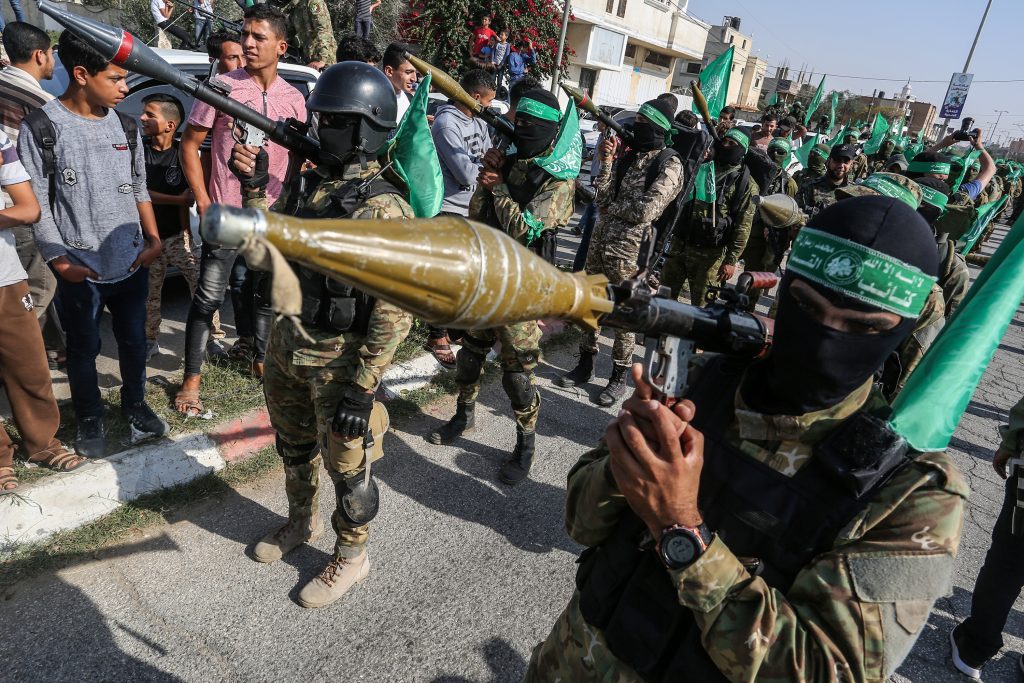IN THE MEDIA
No ceasefire can work unless Hamas disarms
December 19, 2023 | Colin Rubenstein

Daily Telegraph – 19 December 2023
Prime Minister Anthony Albanese and Foreign Minister Penny Wong’s deliberate but very ill-advised decision to break ranks with the US, the UK, Germany and other Western allies on December 12 and vote in favour of a UN General Assembly (UNGA) resolution calling for an immediate humanitarian ceasefire in the war between Israel and Hamas won’t hasten an end to the war. In fact, it may contribute to the opposite outcome.
Although the resolution includes a call for the release of all hostages being held in Gaza, it doesn’t make a ceasefire conditional on this. Indeed, Hamas – the party responsible for the kidnappings – is not even mentioned. It is thus much weaker than the formula that worked in the war’s previous multi-day temporary pause in late November, when Hamas agreed to daily hostage releases in exchange for that pause, increased aid shipments and the release of some Palestinian prisoners in Israeli jails.
Moreover, the profoundly disappointing UNGA vote contradicted the positive policy goals for a “sustainable ceasefire” set out in an admittedly somewhat internally contradictory joint statement released by Australia, Canada and New Zealand the previous night, namely, release of all hostages, the end of the use of Gaza civilians as human shields, and Hamas being disarmed.
It should be obvious that the only way to achieve any such sustainable outcome is for the military pressure on Hamas to continue until it capitulates. Voting in favour of an UNGA resolution calling for an “immediate humanitarian ceasefire” with no conditions on Hamas doesn’t advance Australian interests for such a “sustainable ceasefire”. It works against it.
While everyone is concerned about the humanitarian situation of Gaza civilians and wants to see their plight ameliorated, the best way to end that suffering remains to bring the war to such a sustainable conclusion as rapidly as possible – meaning Hamas must be disarmed – even while stepping up efforts to bring humanitarian aid into Gaza, something Israel has promised to facilitate.
The IDF is already routinely announcing humanitarian pauses of several hours at a time not dependent on Hamas concessions, as well as providing safe corridors for both evacuations and entry of aid convoys. It also recently reopened to aid trucks the repaired Kerem Shalom crossing destroyed by Hamas on October 7, and says it is able and ready to admit as many aid trucks as aid agencies can arrange to bring to Gaza.
This is not to rule out humanitarian pauses like the one that occurred from Nov. 24 to Dec. 1, but by failing to condition the call for a humanitarian ceasefire on anything Hamas does, the UNGA resolution will likely encourage Hamas to harden its position and make reaching agreement on additional humanitarian pauses less likely.
Meanwhile, with Hamas looking increasingly on the ropes as Israeli forces systematically dismantle the organisation’s southern bastion of Khan Younis, with reports of hundreds of its fighters now surrendering, Hamas, which has been caught stealing aid and fuel, should absolutely not be given a lifeline.
As implied by the three conditions Australia and its NZ and Canadian partners specified for a sustainable ceasefire, any outcome to the current conflict which leaves Hamas in control of Gaza and able to rebuild its military capabilities guarantees two disastrous consequences. Firstly, an unrepentant Hamas will once more begin preparing, as its officials have said, to repeat the unprovoked massacre of October 7 “again and again”. And secondly, advancing the negotiated two-state Israeli-Palestinian peace that Australia has long supported will be completely impossible.
That’s why Israel’s Prime Minister Binyamin Netanyahu has laid out some red lines for a post-war future to ensure that October 7 can never be repeated. The international community, including Australia, should support such guidelines, because without them a future two-state peace would be impossible.
Representing the Israeli consensus, Netanyahu has ruled out Israel re-occupying Gaza long term, but demands the IDF will have post-war freedom of action throughout Gaza to thwart terror attacks and prevent Hamas from rebuilding its military capabilities.
Additionally, Netanyahu has ruled out IDF withdrawals from the areas it has cleared of Hamas infrastructure until an alternative administrative body can be found able to maintain stability there. He has also strongly repudiated suggestions that the Palestinian Authority (PA) should constitute that body.
For good reason: Not only have high-ranking PA figures outrageously taken Hamas’ side since October 7, the ageing and corrupt leadership of the PA has effectively lost control over large sections of the West Bank and is barely clinging to power as is, let alone capable of asserting control of Gaza as well anytime soon.
The international community must now seek out viable short-term alternatives to both Israeli or PA administration in Gaza that can deliver the stability war-torn Gazans sorely need during reconstruction. Simultaneously, it must also try to foster a more pragmatic, conciliatory Palestinian leadership that possesses both the legitimacy and the willingness to become a partner for pursuing a viable two-state peace.
Dr. Colin Rubenstein is Executive Director of the Australia/Israel & Jewish Affairs Council (AIJAC).
Tags: Australia, Australian Government, Gaza, Hamas, Israel





